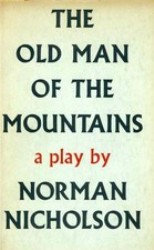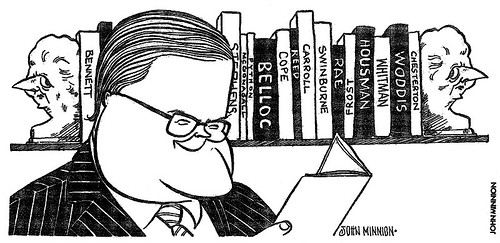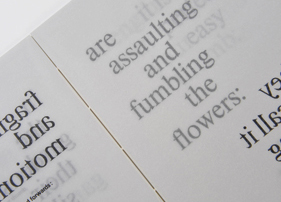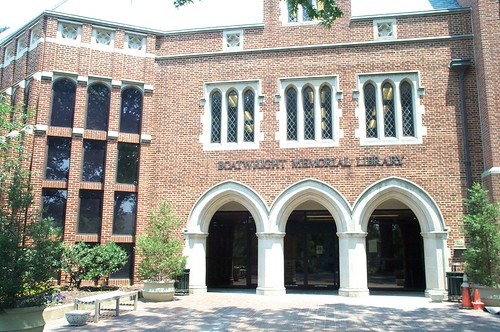|
|
Documenting the quest to track down everything written by
(and written about) the poet, translator, critic, and radio
dramatist, Henry Reed.
An obsessive, armchair attempt to assemble a comprehensive
bibliography, not just for the work of a poet, but for his
entire life.
Read " Naming of Parts."
|
Contact:
|
|
|
|
Reeding:
|
 |
I Capture the Castle: A girl and her family struggle to make ends meet in an old English castle.
|
 |
Dusty Answer: Young, privileged, earnest Judith falls in love with the family next door.
|
 |
The Heat of the Day: In wartime London, a woman finds herself caught between two men.
|
|
|
|
Elsewhere:
|
|
Posts from July 2011
|
|
|
27.4.2024
|
Here's an excellent caricature of Lord Kenneth Baker, drawn by the famed illustrator John Minnion. It appeared in the Listener on September 6, 1990, accompanying a review of Baker's anthology, Unauthorised Versions: Poems and Their Parodies. The review quotes Henry Reed's 'portmanteau' parody of T.S. Eliot, "Chard Whitlow."
If you look closely at the books propped up on the shelf between the twin Thatchers, you'll see REED on one of the spines (right between COPE and CARROLL).
|
1537. Radio Times, "Full Frontal Pioneer," Radio Times People, 20 April 1972, 5.
A brief article before a new production of Reed's translation of Montherlant, mentioning a possible second collection of poems.
|
Team Impression, a printing house based in Leeds, are celebrating their tenth anniversary with a year-long project called Ten, featuring ten 'articles and accompanying posters which are the result of collaborations between some of the world's most prestigious names in graphic design.'
The third collaboration for the Ten project is based on a setting of Henry Reed's "Naming of Parts" by the graphic artist and typographer Pamela Bowman, who co-founded the design studio dust in 2000. What began as a student project at Leeds Metropolitan University in 1995 was eventually published by Simon King Press in 1999 as Lessons of the War: An Artist's Book. In Bowman's design, the text of Reed's poem is presented on see-through stock, illustrating the dream-like, backward-and-forward qualities of the soldier's internalization of his lesson:
The renowned graphic designer and author Ken Garland calls Bowman's book 'a most sensitive and suitable use of translucent paper to convey the idea of parallel spoken and internal text.' Garland and Bowman discuss the work on Team Impression's Ten webpages, where you will see the poster that resulted from their collaboration. Links to purchase a limited, numbered edition of the A2 poster at the bottom of the page!
|
1536. L.E. Sissman, "Late Empire." Halcyon 1, no. 2 (Spring 1948), 54.
Sissman reviews William Jay Smith, Karl Shapiro, Richard Eberhart, Thomas Merton, Henry Reed, and Stephen Spender.
|
I'm still uncovering book reviews by Henry Reed, even in places I've already looked and thought I had exhausted. This week, for instance—just to show you the horribly roundabout way this sort of research goes—I've got a review of two verse plays from the Listener, in 1946: Ronald Duncan's This Way to the Tomb, and Norman Nicholson's The Old Man of the Mountains. Now, I don't have access to the Listener Historical Archive, but I can access an online index of abstracts. So I thought I had found everything Reed wrote for that publication, until...
Until, that is, I discovered this quote in Philip Gardner's critique, Norman Nicholson (Twayne's English Authors series, 1973):
It is easy to agree with Henry Reed's special commendation of Nicholson's protagonist: 'His Elijah is a really dramatic character; the picture of him surrounded by his inspiration, his muddle, his faith and his pathetic self-doubting is particularly fine.' 17[p. 124]
But of course, endnote #17 cannot be viewed in Google Book Search. Surely, I thought, the author must have had Reed mixed up with someone else. Nevertheless, a fieldtrip became imperative in order to check the nearest copy of Gardner's book, at the University of Richmond's Boatwright Library:
And thus, book in hand, the endnote revealed that Reed's review did indeed appear in the Listener, on April 11, 1946. Now, in order to get that issue, I had to request a scan from a library in another state! That in itself is a story fraught with difficulty and disappointment, but suffice to say, after a few days' wait, we had the required pages:
 New Poetic Drama
New Poetic DramaThis Way to the Tomb. By Ronald Duncan.
The Old Man of the Mountains. By Norman Nicholson. Faber. 6s. each
Modern Prose Drama is notorious for its thinness, and one has hoped for a good deal from the poets who have turned their attention to the theatre. At least they have not usually lacked verbal sensitiveness, and it has sometimes been thrilling to hear fresh, unread verse coming over the footlights. Nevertheless, the most remarkable thing about modern poetic plays has been their crudity. Poor management of the most elementary requirements of the stage, a charade-like quality, and an excessive simplification have sometimes been offered to us as though they were a kind of jemenfoutiste virtue; amateurishness has glared at the reader from the printed page, and the most adroit stage-production has failed to disguise the same quality in the theatre. Two poetic plays alone have held the stage successfully, both by a hard-working major poet: 'Murder in the Cathedral' and 'The Family Reunion'. In spite of certain awkwardness of technique, which one liked no better for their being intentional, these plays continue to move one, because they fulfil two of the principal requirements of drama; they tell stories which embody impressive truths, and they create credible and important characters, whose actions and changes of mood compel attention.
Mr. Ronald Duncan's play 'This Way to the Tomb' strongly recalls 'Murder in the Cathedral': it is based on the theme of temptation and the breaking-down of pride, it has a satirical modern-section which is presumably meant to be funny, and it closes on a note of religious exaltation. The first half of the play is a masque dealing with the last days of Saint Antony on the island of Zante: his temptation, his cry for mercy, and his salvation; it has at times a dignity worthy of its subject. The second part is an anti-masque, showing a crowd of clamorous rationalists visiting Antony's tomb, and proving by experiment that faith is only an illusion and superstition. Father Opine, who leads this rowdy band, turns out in the end, when confronted by the saint himself, to be identified with Bernard, the intellectual among Antony's early disciples. Our own age is always easy to make fun of—as Ben Jonson, Mr. Duncan's model, has shown. There is a depressing staleness about this second half of the play, with its boring conventional cleverness and its use of stage tricks (the satirical 'blues' for examples) which their originators have already abandoned; and the last pages do not succeed in dragging the play up again from the depths. True, the author occasionally comes out with a beautiful and touching image:And I believe Christ lies in my heart like a green
leaf in an old book
Revealed, if I could only find my heart,
open it and look. But for the greater part of the play, his verse contents itself with easy-going sermonising, not often distinguished from platitude.I have described myself and fears
Because the one is made up of the other;
And because, clarity towards one's conscience
is a kind of prayer.
But eloquence and verbal gymnastics
Only persuade, against run of logic,
And leave one where one was before. 'The Old Man of the Mountains' is an infinitely more attractive play. It is true that if you write a play about Elijah and the Raven, you are likely to bring the Raven on to the stage, but doubtless he can be made an impressive and not an absurd creature. Mr. Nicholson, while he is about it, has given us ('off') a babbling beck as well, and has allowed its voices to speak charming verses something after the manner of 'Anna Livia Plurabelle'. Apart from these novelties, the play is a more or less straight three-acter, the first act dealing with the drought and the raising of the boy, Ben, from the dead; the second with the dispute between Elijah and Ahab; and the third with the contest on the mountain-top between the altars of Baal and the Lord; and the advent of the cloud no bigger than a man's hand. Mr. Nicholson has transplanted his characters to the Cumberland dales he has written of so well before, and he has avoided the sentimental humour that attends Mr. Bridie's rehashes of the Scriptures. His Elijah is a really dramatic character; the picture of him surrounded by his inspiration, his muddle, his faith and his pathetic self-doubting is particularly fine. The long scene between him and the boy on the mountain is a delight; we are bound to know beforehand the outcome of that vigil against the unmoved brilliant heaven; it is a considerable triumph for Mr. Nicholson that he should give back to the famous cliché, when it is finally uttered, some of its original splendour.
The verse passages of the play are very well done. Mr. Nicholson has boldly called for realistic settings, but he knows the limitations of even the best scene-painter, and he supplements them with thrilling vividness And there I watch
A farmer put a match to a neighbour's grain.
The straw catches light, weasels of flame
Twist among the stalks of the corn, and the thorns
in the dyke
Blossom with fire. Now the barns are alight
And women shriek from the casements, and a wind
Sprinkles the sparks like shooting stars. Long
ropes of fire
Loop the spires of the larches. The play is apparently a first effort in drama; but it is an enormously promising one, and it is to be hoped that Mr. Nicholson will soon attempt a play with a plot of his own invention.Henry Reed
[p. 486] Nicholson is an interesting character. He was born in Millom, Cumberland, in 1914, and lived almost his entire life in the same house he was born in. He had tuberculosis as a teenager, which must have kept him out of active service during the Second World War. He wrote a considerable amount of poetry—mostly about his native Cumbria—as well as several novels and plays. Like Reed, he isn't associated with any poetry movement, but is rather considered a solitary figure in his use of straightforward language and plain-speaking style. Before his death in 1987, Nicholson had garnered several poetry prizes, as well as an OBE. Here is an interactive video on Norman Nicholson, including Neil Curry reading five of his poems.
He also cultivated the most striking set of sideburns.
|
1535. Reed, Henry. "Talks to India," Men and Books. Time & Tide 25, no. 3 (15 January 1944): 54-55.
Reed's review of Talking to India, edited by George Orwell (London: Allen & Unwin, 1943).
|
|
|
|
1st lesson:
Reed, Henry
(1914-1986). Born: Birmingham, England, 22 February 1914; died: London, 8
December 1986.
Education: MA, University of Birmingham, 1936. Served: RAOC, 1941-42; Foreign Office, Bletchley Park, 1942-1945.
Freelance writer: BBC Features Department, 1945-1980.
Author of:
A Map of Verona: Poems (1946)
The Novel Since 1939 (1946)
Moby Dick: A Play for Radio from Herman Melville's Novel (1947)
Lessons of the War (1970)
Hilda Tablet and Others: Four Pieces for Radio (1971)
The Streets of Pompeii and Other Plays for Radio (1971)
Collected Poems (1991, 2007)
The Auction Sale (2006)
|
Search:
|
|
|
Recent tags:
|
Posts of note:
|
Archives:
|
Marginalia:
|
|











